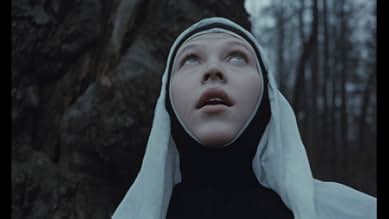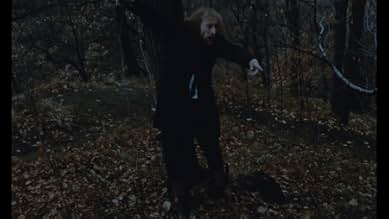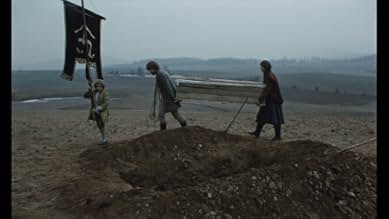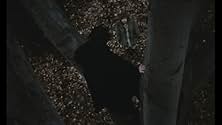IMDb-BEWERTUNG
7,0/10
3301
IHRE BEWERTUNG
Füge eine Handlung in deiner Sprache hinzuYoung Polish noble Jakub, freed during 1793 Prussian invasion, experiences father's death, betrayal. Traumatized, he follows his savior, committing brutal murders across the country.Young Polish noble Jakub, freed during 1793 Prussian invasion, experiences father's death, betrayal. Traumatized, he follows his savior, committing brutal murders across the country.Young Polish noble Jakub, freed during 1793 Prussian invasion, experiences father's death, betrayal. Traumatized, he follows his savior, committing brutal murders across the country.
- Regie
- Drehbuch
- Hauptbesetzung
Empfohlene Bewertungen
The devil epileptically dancing the beauty of the world in front of the eyes of a dying man, the victim of his deceit and evil schemes, how cruel, ironic and jaw-droppingly macabre that can be... and the dark blue unctuous atmosphere, the claustrophobic feeling that the mazy woods, the snow give despite the haywire dynamics in an open landscape, people like pawns spinning on a chessboard manipulated and controlled through their weaknesses by master puppeteers who use lust and envy and madness as levers of their domination, God represented by the constant presence of the nun, witnessing with a neutral frozen mercifulness the gyratory display of human delirium and the devil's catalytic actions.. I know now that only after seeing this sublime film and being impacted by it I've became a true Żuławski fan
I wouldn't call this horror at least not in the traditional sense. Jakob freed from jail tries to return to his previous life with a aid who has his own agenda. The Devil is in the details indeed as you the viewer are forced to play catch up with a series of events that must be interpreted to understand the craziness and violence this movie portrays.
There is in impatience that plagues every event along with musical scores that tries as it does to build tempo and rhythm to the maniacal. Does it really matter who Jacob was? Butchery to betrayal, the nun and a whole lot of death and suffering all wrapped up in a wacky 70's score. Best not to leave out that almost every character is full of self loathing.
Not sure if I'd watch it twice though, the dialog isn't very captivating and the story isn't really what you are here for. You watch it because someone didn't want you to see something with a powerful political message. Like having your world turned upside down. So you'll watch it like I did, hoping to find something everyone else missed.
There is in impatience that plagues every event along with musical scores that tries as it does to build tempo and rhythm to the maniacal. Does it really matter who Jacob was? Butchery to betrayal, the nun and a whole lot of death and suffering all wrapped up in a wacky 70's score. Best not to leave out that almost every character is full of self loathing.
Not sure if I'd watch it twice though, the dialog isn't very captivating and the story isn't really what you are here for. You watch it because someone didn't want you to see something with a powerful political message. Like having your world turned upside down. So you'll watch it like I did, hoping to find something everyone else missed.
Thick smoke, nuns and screams. Crazy people and blood. Intense lighting and use of colour amidst the chaos. Each frame seems crowded - either through closeup or frenzy; moments of stillness are rare. Who is the stranger who saves Jakub? Why the nun? The madness of his surroundings - acrobats and theatricals, dancers and whores, mirror the insanity of the world. There is no goodness here. Monstrosity is the only answer.
During the joint Russian,German (Prussian) and Austrian invasion to Poland in 1793, a young Polish nobleman Jacob is saved from the imprisonment by a stranger who wants in return to obtain a list of Jacob's fellow conspirators. It is a bargain. Maybe implicitly, Jakub sold his life to this stranger, following his mysterious savior across the country, Jacob becomes a witness to chaos and moral corruption that is ensuing the partition and dissolution of Poland by the neighbor countries. People everywhere seems to gone mad and crazy, including Jacob's own family and his beloved girlfriend.
Being apparently demented by what he has seen, he, amidst his own delerium of his consciousness fading away, commits noumerus of gory and enigmatic killings derailing in social and political turmoil by mass murders, leading to insanity and desperation. This stranger, who acts as a guide, displays horrific sights of this physically and morally destroyed 18th-Century nation, whispering the actions of Jakub and acting as an evil motor. But there is free will in Jakub as well, which remains unquestionable.
The film was immediately banned by the censors of the then-communist Polish government and the director was soon forced to leave Poland. Almost two decades later, in the last days of communism in Poland, Zulawski have somehow obtained a copy of his film from censorship vaults and immediately presented it during nearest film festival in Tokyo in 1988. Albeit very late, the film premiere has had received a lot of applause from viewers and film critics alike.
Zulawski's invigorating style shines as brightly as ever, his vision of insanity displayed at every corner, its a world fueled by animal instincts and sexual deviance, permeated with enough filth to make the devil dance in joy. Where each frame is filled with details that are caught by the eye either consciously or subconsciously. Camera management is aggressive and intrepid, never giving up, never hesitating to the depiction of scandalous content, shifting tones and creating authentic psychological horror with remarkable success.
It is as ugly as it is mesmerizing. Andrzej Zulawski's cinema is the definition of madness, the real meaning of insanity, and the truth of the quest of craziness. This film Diabel is flawlessly made, perfectly filmed, completely insane, profoundly depicted. With the typical emotional attacks of anger and madness expressed by the various characters. He represents an absolute and incontrovertible chaos, subjecting the vision to a frenetic and frustrating horror. In Diabel, Zulawski seems to point out we should stop worrying about the Devil since it is already Hell on Earth...
Being apparently demented by what he has seen, he, amidst his own delerium of his consciousness fading away, commits noumerus of gory and enigmatic killings derailing in social and political turmoil by mass murders, leading to insanity and desperation. This stranger, who acts as a guide, displays horrific sights of this physically and morally destroyed 18th-Century nation, whispering the actions of Jakub and acting as an evil motor. But there is free will in Jakub as well, which remains unquestionable.
The film was immediately banned by the censors of the then-communist Polish government and the director was soon forced to leave Poland. Almost two decades later, in the last days of communism in Poland, Zulawski have somehow obtained a copy of his film from censorship vaults and immediately presented it during nearest film festival in Tokyo in 1988. Albeit very late, the film premiere has had received a lot of applause from viewers and film critics alike.
Zulawski's invigorating style shines as brightly as ever, his vision of insanity displayed at every corner, its a world fueled by animal instincts and sexual deviance, permeated with enough filth to make the devil dance in joy. Where each frame is filled with details that are caught by the eye either consciously or subconsciously. Camera management is aggressive and intrepid, never giving up, never hesitating to the depiction of scandalous content, shifting tones and creating authentic psychological horror with remarkable success.
It is as ugly as it is mesmerizing. Andrzej Zulawski's cinema is the definition of madness, the real meaning of insanity, and the truth of the quest of craziness. This film Diabel is flawlessly made, perfectly filmed, completely insane, profoundly depicted. With the typical emotional attacks of anger and madness expressed by the various characters. He represents an absolute and incontrovertible chaos, subjecting the vision to a frenetic and frustrating horror. In Diabel, Zulawski seems to point out we should stop worrying about the Devil since it is already Hell on Earth...
The previous poster calls the cruelty at display in this film "inhuman". Oh really? How come then that people slaughter people, gouge their eyes out, cut their limbs or burn them alive? Or torture them? Or rape and mutilate women? He should read some reports about practices during the Bosnian war or wars in Africa, about the stuff people have been doing to other people for ages, for reasons like religion, greed or lust. Or for no reasons at all. It took real "balls" or creative guts from the filmmaker to do a film like that. I am fed up with the political correctness and general blandness of films, caused by the requirements of market and profits, or by mere cowardliness. I could understand criticism of the cruelty if it was purely gratuitous but it is not. This film has artistic values and touches upon important topics. I am happy it was not destroyed and all copies not locked up somewhere. It could probably happen in Hollywood or in the lands like Iran.
Wusstest du schon
- WissenswertesThe film was banned in communist Poland.
- VerbindungenFeatured in Brows Held High: Häxan (2012)
Top-Auswahl
Melde dich zum Bewerten an und greife auf die Watchlist für personalisierte Empfehlungen zu.
- How long is The Devil?Powered by Alexa
Details
Zu dieser Seite beitragen
Bearbeitung vorschlagen oder fehlenden Inhalt hinzufügen


























